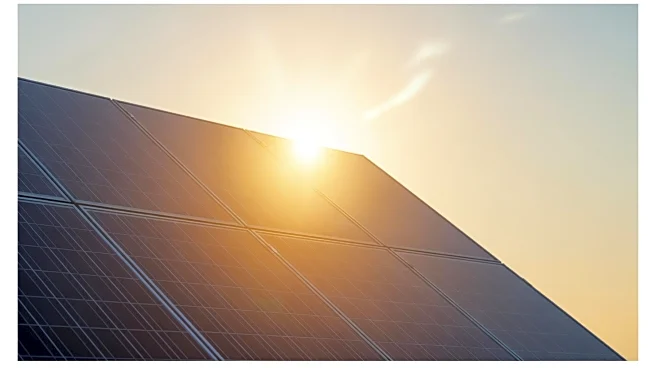What's Happening?
Solar energy is increasingly being recognized as a reliable solution to combat power outages, particularly in regions prone to natural disasters. In Jamaica, Hurricane Melissa caused widespread power outages, but homes equipped with solar panels maintained
electricity, highlighting the resilience of solar power. The growth of rooftop solar panels in Jamaica has surged from 1.4 megawatts in 2015 to nearly 65 megawatts in 2023, contributing to about 10% of the island's power generation. This trend is not isolated to Jamaica; globally, countries are adopting solar and other small-scale renewables to gain independence from unreliable grids and reduce reliance on imported fossil fuels. Distributed energy resources (DERs), including microgrids and virtual power plants, are becoming popular due to their scalability and ability to provide localized energy solutions.
Why It's Important?
The shift towards solar energy represents a significant move away from fossil fuels, offering a cleaner, more sustainable power source that can mitigate the impacts of climate change. For countries like Jamaica, solar energy provides a means to reduce dependency on imported oil and gas, which are subject to price volatility and supply disruptions. The adoption of solar energy can lead to lower electricity costs for consumers and enhance energy security. Moreover, the global embrace of solar energy, particularly in emerging markets, underscores its potential to drive economic growth and development by providing affordable and reliable electricity. This transition is crucial for achieving global climate goals and reducing carbon emissions.
What's Next?
As solar technology continues to advance, its adoption is expected to grow, with more countries investing in solar infrastructure to enhance energy resilience. In the U.S., plug-in solar systems are gaining popularity, offering a cost-effective solution for households to reduce electricity bills without the need for extensive installations. With state-level reforms, plug-in solar could reach 60 million Americans by 2035. Globally, countries are setting ambitious targets for solar capacity, with initiatives like Thailand's community solar plan aiming to add 1.5 GW of capacity through small projects. These developments indicate a broader shift towards decentralized energy systems that prioritize sustainability and energy independence.
Beyond the Headlines
The increasing reliance on solar energy has ethical and cultural implications, as it empowers communities to take control of their energy needs and fosters a culture of sustainability. The transition to renewable energy sources like solar also raises questions about the future of fossil fuel industries and the economic impacts on regions dependent on oil and gas production. Additionally, the widespread adoption of solar energy could lead to significant shifts in global energy markets, influencing geopolitical dynamics and trade relations.















